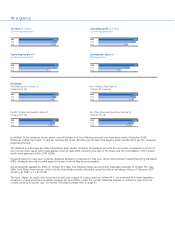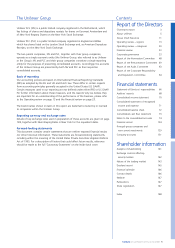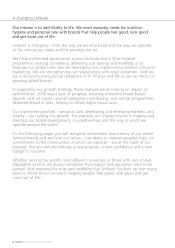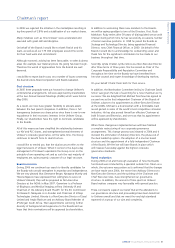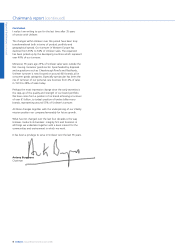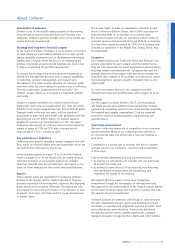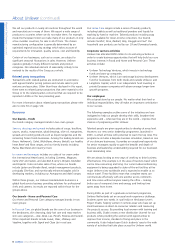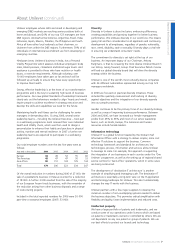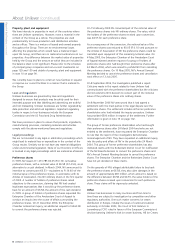Unilever 2006 Annual Report Download - page 12
Download and view the complete annual report
Please find page 12 of the 2006 Unilever annual report below. You can navigate through the pages in the report by either clicking on the pages listed below, or by using the keyword search tool below to find specific information within the annual report.
Unilever Annual Report and Accounts 2006 9
Report of the Directors (continued)
About Unilever (continued)
from seeking freezer cabinet exclusivity for their products in the
Irish market. HB Ice Cream submitted an appeal to the European
Court of Justice in Luxembourg (‘ECJ’) against the decision of the
CFI. On 28 September 2006 the ECJ dismissed the appeal.
Following the CFI decision freezer exclusivity in Ireland has not
been enforceable from October 2003 onwards, in outlets which
only have HB freezers. From 2003 Unilever Ireland has complied
with the Commission decision. With the ECJ judgement this
position has now become final. Similar consequences may apply
in specific European markets with equivalent structures to those
described in the Commission and CFI decisions. There is a
possibility of claims for damages, in the event of which Unilever
will defend its position vigorously. The case between HB Ice
Cream and Masterfoods, which has been before the Irish Courts
since 1990 and which had been deferred pending the final
determination of the appeal against the Commission decision,
has been reopened at the request of Masterfoods. It is noted that
in the UK since 2000, when cabinet exclusivity was effectively
abandoned following undertakings given by Unilever to the UK
competition authorities, therehas not been any material change
in Unilever’s relevant market share.
In 2006 the French competition authorities commenced an inquiry
into potential competition law infringements in France involving a
number of consumer goods companies in the home and personal
care sector, including Unilever France and Lever Faberge France,
both subsidiaries of the Unilever Group. To date, no statement
of objections has been lodged against either Unilever France
or Lever Faberge France and accordingly the potential financial
implications, if any, of this investigation for such companies
cannot yet be assessed.
During 2004 the Federal Supreme Court in Brazil (local acronym
STF) announced a review of certain cases that it had previously
decided in favour of taxpayers. Because of this action we
established a provision in 2004 for the potential repayment
of sales tax credits in the event that the cases establishing
precedents in our favour are reversed. Since that time we have
continued to monitor the situation and have made reductions
as appropriate to the amount provided.
Also during 2004 in Brazil, and in common with many other
businesses operating in that country, one of our Brazilian
subsidiaries received a notice of infringement from the Federal
Revenue Service. The notice alleges that a 2001 reorganisation
of our local corporate structure was undertaken without valid
business purpose. If upheld, the notice could result in a tax claim
in respect of prior years. The 2001 reorganisation was comparable
with that used by many companies in Brazil and we believe that
the likelihood of a successful challenge by the tax authorities is
remote. This view is supported by the opinion of outside counsel
but there can be no guarantee of success on the merits.
Corporate responsibility
Weseek to manage and grow our business around the world in
aresponsible and sustainable way. The values and standards by
which we expect to be judged are set out in our Code of Business
Principles.
We aim to share these standards and values with our suppliers
and contractors through our Business Partner Code, which sets
out standards on ten key points of business integrity, labour
standards, consumer safety and the environment.
The long-term success of our business is intimately linked with the
vitality of the environment and communities in which we operate.
Each year we report on our contribution to sustainable
development. This is available online at the Environment & Society
section of www.unilever.com.Our report describes how we are
working in partnership to address issues such as poor nutrition
and hygiene, how we continue to work on reducing our
environmental impacts, and our contributions of €78 million to
communities. The strength of our commitment to sustainable
development is reflected in our leadership of the food industry
category of the Dow Jones Sustainability Indexes for the eighth
year running.
In our Operating review on pages 13 to 22 we give a glimpse of
the ways in which our brands are addressing consumers’ social
and environmental concerns.
Risk management
The following discussion about risk management activities
includes ‘forward-looking’ statements that involve risk and
uncertainties. The actual results could differ materially from
those projected. See the ‘Cautionary Statement’ on the inside
back cover.
Unilever’ssystem of risk management is outlined on page 66.
Responsibility for establishing a coherent framework for the
Group to manage risk resides with the Boards. The remit of the
Boards is outlined on page 34.
Particular risks and uncertainties that could cause actual results to
vary from those described in forward-looking statements within
this document, or which could impact on our ability to meet our
published targets, have been identified. In this context the
following specific risks have been identified as areas of focus
in 2007.
Sales and profit growth
The increasingly competitive environment, the further
consolidation in the marketplace and continued growth of
discounters could adversely impact our rate of sales growth and
our profit margins. In the light of this, we will continue to invest
in selected brands and high growth market areas to ensure that
we deliver profitable sales growth. Our continued sales and profit
growth depends in large part on our ability to generate and
implement a stream of consumer-relevant improvements to our
products. The contribution of innovation is affected by the level of
funding that can be made available, the technical capability of the
research and development functions, and the success of operating
management in rolling out quickly the resulting improvements.
Our focus will continue to be on developing our brands in ways
that aredistinctive and are relevant for our customers.



